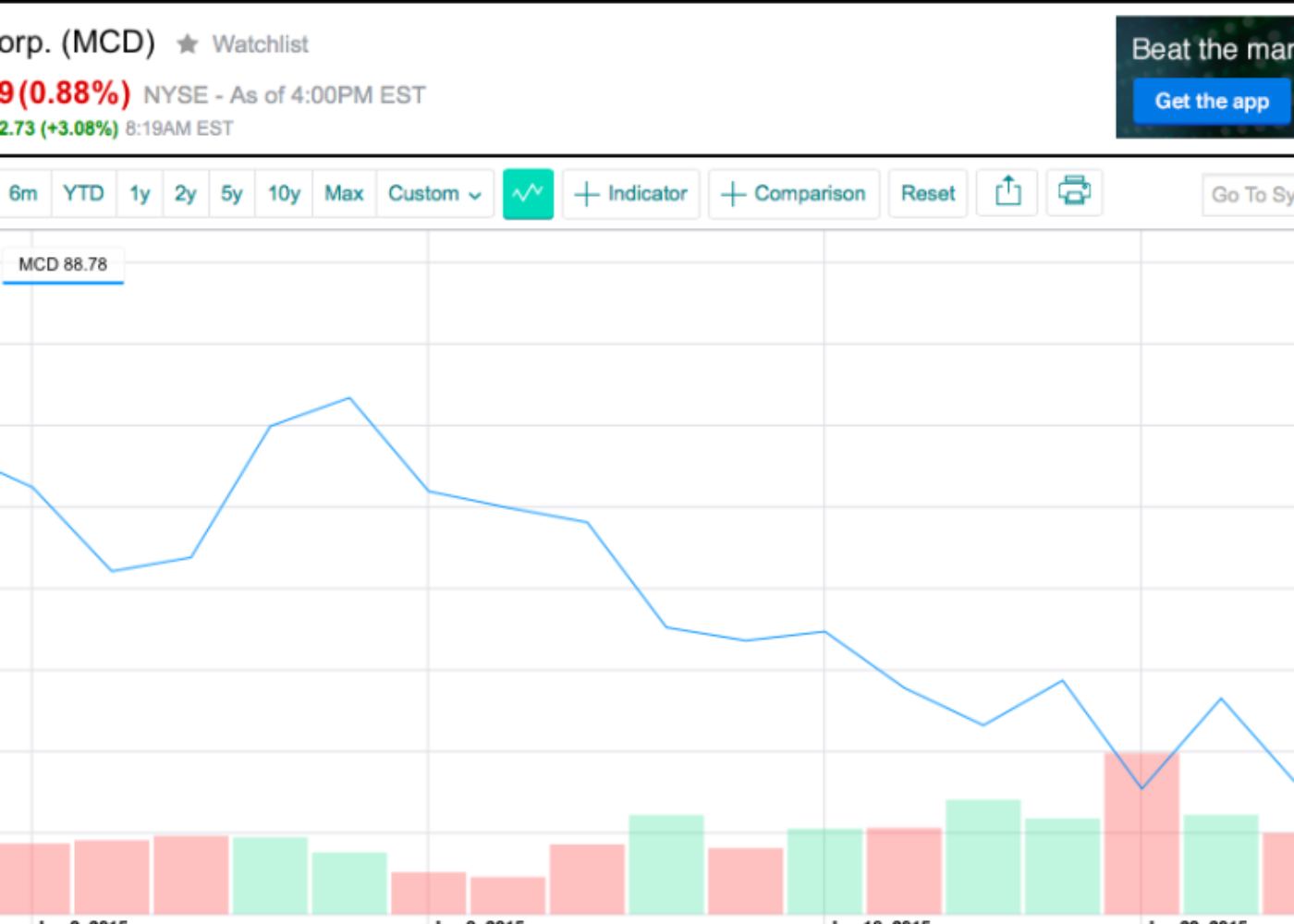Have McDonald’s Golden Arches Lost Their Shine?

The food awakening is on, and it’s shining a harsh light on the Golden Arches which just reported its first decline in same-store sales in the US for almost a decade, continuing four consecutive quarters of poor financial performance.
The number of 19-21 year olds who ate at McDonald’s in December fell 12.9 percentage points compared to 2011.
Over the past year, senior executives have blamed supply chain issues in China, restaurant closings in Russia and even bad weather. But deeper trends should create concern for financial analysts, investors, and McDonald’s Chief Financial Officer (CFO) Peter Bensen.
Simply put, McDonald’s and its business model are out of touch. It has seen significant drops in patronage by core segments of its customer base in just three years. Worse, it’s losing ground to competitors – like Chipotle – that it once owned. Wednesday night, McDonald’s CEO, Don Thompson, announced that he stepping down.
McDonald’s competitors are meeting the needs of the 21st century customer and have adjusted to health-conscious diners, but McDonald’s has not. And McDonald’s primary crisis-management strategy— kid-targeted marketing, staff shakeups , new menu items and more marketing — is not cutting it this time. What worked in the past isn’t working for 21st century families.
I should know. Fifteen years ago, I monitored McDonald’s as a financial analyst and observed the upward growth trajectory. Sure there have been health concerns, stoked by documentaries like “Super Size Me” – but McDonald’s saw consecutive growth in global comparable sales.
The tides have turned. The Wall Street Journal reported that net income fell last year by almost 15%. For more than a year now, McDonald’s U.S. sales have struggled. In October, the corporation reported a staggering 30% drop in third quarter profits.
So, what changed?
There has been a food awakening. People are realizing our food system is broken, and this breakdown is contributing to disease. Younger consumers are willing to pay more for better food, and they are connecting the dots between an epidemic of childhood obesity and diabetes and obscene amounts of money junk food brands like McDonald’s and Coca Cola spend marketing to children. It’s not just a mom who carries the “veto vote” anymore, it is also the family member or friend with food allergies or diabetes.
People are taking action, globally and locally. Recently, Berkeley, CA overwhelmingly approved a 1 penny/oz. soda tax. A David and Goliath story, the grassroots initiative prevailed despite more than $2 million in outside spending by the beverage industry. Millenials are paying more for better food.
And people are directly challenging junk food corporations. Parents and health professionals have called on McDonald’s to stop marketing junk food to children. Intrepid youth advocates like 11 year-old Hannah Robertson have brought this call to McDonald’s shareholders’ meeting, and just a few weeks ago 70 parents and children rallied in Chicago with one demand for McDonald’s top executives: Retire Ronald McDonald.
This food awakening has changed the competitive landscape, and 20th century brands like McDonald’s are becoming obsolete as they ignore the shifting demands of 21st century families.
Moreover, as this movement gains speed and visibility, McDonald’s is losing its core customer base, and seeing significant turnover at the very top. In fact, it’s seen at least eight senior executive level changes in the last two years. These transitions undoubtedly undermine franchisee confidence in the corporation even further, as relationships are already at an all-time low and have yet to find the person with the magic cure for its woes.
But there is no magic cure. There’s only the reality that as long as the corporation remains out of touch with shifting consumer demand, it will continue to miss the mark and miss earnings.
My experiences as an analyst and as a mother point to the same conclusion — it is the very consequences of McDonald’s outdated business model that have negatively affected the health of American families and are driving a shift in consumer demand. Failing to recognize this shift is not only costing McDonald’s its customers, it’s costing their shareholders, too, while its competitors like Chipotle thrive.
And, according to recent comments from McDonald’s new U.S. President Mike Andres, it is clear the company has resolved to double-down on the same tactics that people are pushing back on. During a call with investors, Andres said, “[Owner Operators] have got to be in the schools… this is an essential part of being a McDonald’s owner operator. This is our heritage.”
This may have been their heritage in the 20th century, but it will make them a relic if they fail to change.
For McDonald’s to continue responding to growing public concern with public relations efforts, especially those targeting kids, is out of touch, and it creates significant financial risk for the corporation. Worse, it can open McDonald’s up to a possible shareholder lawsuit down the road for refusing to protect shareholders from a fundamental shift in consumer demand. Food allergies, autism and cancer are not a trends. The President’s Cancer Panel reports that 41% of us are expected to get it in our lifetimes.
The Golden Arches has long tried to associate itself with happiness and fun. But today, McDonald’s has increasingly come to symbolize unhealthy food and, ultimately, sickness. The longer top executives wait to recognize this and move to meet the evolving needs of 21stcentury families, the worse it will get. The time to act is now. The landscape in front of the company is wide open.





